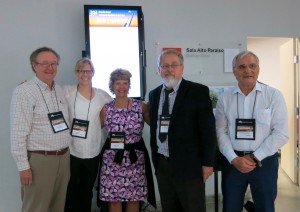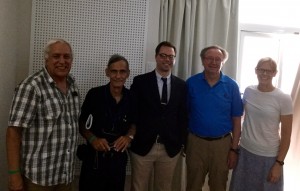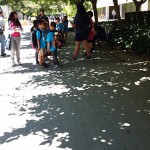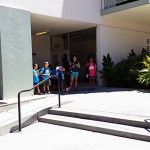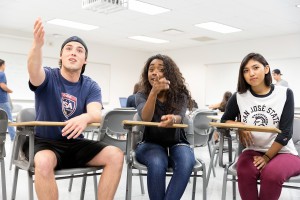
Photo by David Schmitz
Spartan Scholar Program students engage with a faculty member during a summer course before the start of their freshman year.17
On a July afternoon, new Spartans filled half of the tables in the Dining Commons, laughing and chatting with each other as though they had known each other for years. The 112 incoming first-year students had only met each other three weeks before when they moved into the residence halls to participate in a five-week summer transition program, but the 12-hour days they spent together allowed them to build strong bonds quickly.
The students were participants in the Spartan Scholars Program, a new summer residential program that provides college readiness support in English and math while also preparing admitted Spartans for the transition from high school to university life.
“It’s an opportunity to get familiar with the campus,” said Kevin Cardona, a student from Oakland who plans to major in civil engineering. “It’s exciting to try out this new thing and get ahead – to be prepared. We have our own little community.”
Cardona is the first in his family to attend college. He said the rigorous schedule for the program that includes English or math classes, tutoring sessions, study hall, and social activities has helped him set his expectations for his first semester.
The five-week summer program is free to students. SJSU covers associated summer costs, including tuition, room and board on campus, textbooks and weekend activities. Students who applied were selected based on admission to SJSU, academic need, financial aid eligibility, English placement test and entry level mathematics examination scores, educational and personal background.
Academic Affairs and Student Affairs submitted a joint proposal for funding for the program through the Student Success, Excellence and Technology Fee, approved by the Campus Fee Advisory Committee, which includes student representatives. SJSU plans to expand access to the Spartan Scholars Program through funding from the Koret Foundation, which awarded SJSU $2 million to use toward student success programs.
The program is one of many initiatives in SJSU’s Four Pillars of Student Success plan that is focused on improving college readiness. More than 30 percent of incoming freshmen admitted to SJSU require additional support in math, English or both to prepare for college-level courses.
Debra Griffith, the AVP for Transition and Retention Services in Student Affairs, said Drew Agbay, who served as the program director, coordinated with students, staff, faculty and other campus partners to make the summer session successful.
“Launching the Spartan Scholars Program was a huge undertaking and would not have been possible without (them),” Griffith said.
Sabrina Martinez, a kinesiology major from Stockton, said her father is an SJSU graduate who is proud that she is now a Spartan, too.
“It’s great to be able to have a head start and refresh your memory for school,” she said, noting that making friends was one of the best benefits of the program. “Everyone is getting along. We won’t be alone when the semester starts.”
Alyssa Vargas, a psychology major from Fresno, said she also appreciated making connections on campus.
“We will have help in the fall,” she said. “We have people to ask for help.”
Jessica Padron, who is from Long Beach, said the summer program offered a chance to settle in at SJSU from Southern California.
“It made the transition a lot easier,” she said. “I’ve made a lot more friends and I know a lot more resources.”
She wants to be a teacher and minor in public relations.
“It really helped with time management because it was a rigorous schedule,” she said.
Fatima Soriano, who is from Los Angeles, agreed with Padron that living on campus helped her adjust to life in San Jose.
“It’s an opportunity to come in knowing how college works and to build relationships, so you don’t have to come in alone,” she said.
Lia Castellanos, the community director for the Spartan Scholars Program this summer, is a graduate student, ’17, Biotechnology, and Fulbright Scholar.
“The academic part of the program is important, but we need to balance that with time to relax,” she said, noting that despite the stringent weekday schedule, the students had more free time on the weekends. “It’s been great getting to know the students. They have so much energy. I see their faces are so excited for the fall and the possibilities.”
Castellanos said the group activities included a mix of reflective activities and more fun competitions such as a water balloon challenge.
“They understand it is a great privilege to be here,” she said. “It is helping them understand their own skills and they are realizing they can do it. It is amazing to see that process every single day.”
